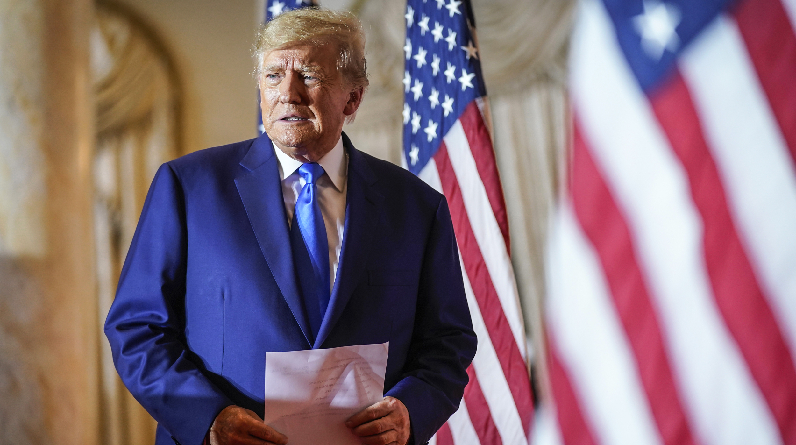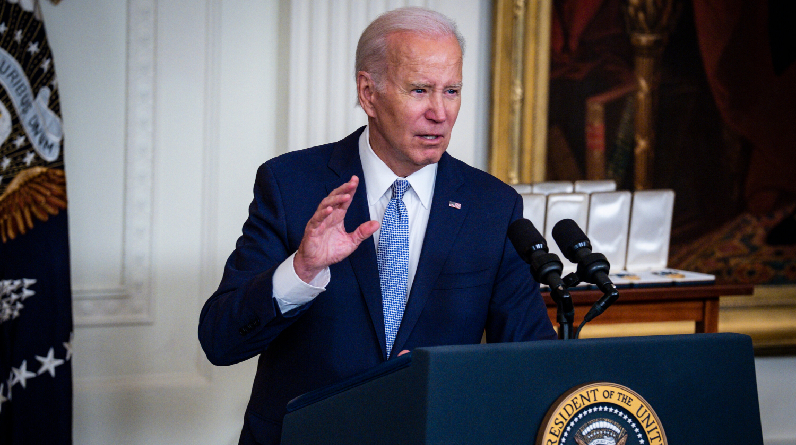How likely is Trump’s survival at this point?

The next presidential campaign is well underway, but the dust is still settling from this week’s midterm elections. Indeed, one could argue that the 2024 campaign began long before last Tuesday’s vote, given the pronouncements of President Joe Biden and former President Donald Trump over the past few months.
Although the prospect of a third presidential run by Donald Trump remains high, the results from last Tuesday’s election may have altered the political calculus for Republicans, if not for the former president himself. Trump’s long-held status as the Republican Party’s leader is showing signs of cracking for the first time in quite some time. Considering this, where do Republicans go from here?
The Red Tsunami That Never Came
A “red wave,” in which Republicans would win a majority of legislative, gubernatorial, and lower house seats across the country in the 2022 midterm elections, was a popular topic of conversation among political pundits in the weeks leading up to the vote. The Republican Party, however, was left feeling downtrodden on Election Day; while the party did not suffer a catastrophic loss, neither did the much-touted “red wave” emerge.
Many political analysts have predicted that Republicans will easily control both houses of Congress come 2023, but at the time of publication, this remains uncertain. As a whole, independent voters broke for the Democrats by 4%, with larger margins in swing states; in Arizona, for example, independents favoured the Democrats by a staggering 30%. From the Senate race in Pennsylvania to the governorship in New York, many close races were ultimately won by the Democrats.
Just what went wrong for the Republican party?

Many Trump-backed candidates failed to win their elections, as has been widely observed. In many cases where the Republicans could have won, they lost to the Democrats because their candidates were so unattractive that they alienated even the most ardent Trump supporters. Purple Republican Doug Mastriano was soundly defeated by Democrat and state attorney general Josh Shapiro in Pennsylvania’s gubernatorial election. When Republican Rep. Peter Meijer faced a primary challenge in Michigan, his seat in the 3rd Congressional District flipped to the Democratic Party. Republicans would be in a much stronger position now if they had put forward candidates who were less strident and more pragmatic.
Furthermore, in the tightest of races, having Trump’s support ended up being a detriment. The nonpartisan Cook Political Report labelled 35 House races in 2022 as toss-ups, and Trump endorsed candidates in five of them, but they all lost. This was noted by The New York Times’ Michael C. Bender and Maggie Haberman. Trump and his supporters have a hard time making excuses for this outcome. It’s true that some people haven’t even attempted it.
At the same time, Florida was one of the few states where the GOP performed well on Tuesday. After eking out a narrow victory in 2018, Governor Ron DeSantis won reelection by a comfortable 19% margin. Furthermore, the governor’s popularity likely contributed to the red wave that carried Senator Marco Rubio to a 16-point victory over his opponent, flipped three Democratic House seats to the GOP column, and gave the Republicans supermajorities in both houses of the Florida legislature. DeSantis is very well-liked in his home state of Florida, and the results from last Tuesday made him the clear frontrunner for the Republican nomination in 2024.
Are you sick of Trump?
It was one of Trump’s greatest advantages as a presidential candidate in 2016 that he saw the realignment in the Republican Party coming long before anyone else. Since his election, the Republican Party has become the populist party of the United States and the party of the working class. In 2016, Trump was able to portray himself as a candidate of the people because he was an outsider running against the consummate insider, Hillary Clinton. Although unconventional, his bombastic style convinced enough voters that his presidency would not be business as usual to win the popular vote.
After his unexpected victory, Trump took control of the Republican Party and made it his own. The Republican Party became more and more of a “personality cult” as a result of his tendency to make everything about himself, including loyalty tests and enemy lists. That meant Senators Ted Cruz, Lindsey Graham, and Marco Rubio, who had all spoken out against him, had to make an about-face if they wanted to keep their seats in the Senate. The majority of those who refused, from early heretics like then-Senator Jeff Flake to more recent blasphemers like Rep. Liz Cheney and Sen. Pat Toomey, have either retired or been defeated in their respective parties’ primaries.
The majority of Republican politicians, however, toed the party line and supported Trump through two impeachments and continued to give him lip service after he left office. After Trump was defeated in 2020, however, things started to alter. Not only did he try to legally and illegally overturn state vote tallies (remember “find me 11,000 votes?”) and then incite the violent Capitol riot on January 6 out of adolescent pique, he also turned his loss and his belief that the election was stolen right out from under him into the greatest loyalty test ever. Some people, like Glenn Youngkin, have been able to avoid getting too close to the fire and avoid getting burned; Youngkin won an upset victory in the 2021 Virginia gubernatorial race in part because he avoided getting too entangled with Trump and election denial. Others haven’t been so lucky and have been bullied into toeing the line (see: McCarthy, Kevin).
However, many in the American electorate, including those who had backed Trump in the past, have soured on the former president, even if his staunchest supporters may still love the fact that he’s committed to “owning the libs.” A recent survey by Morning Consult found that the share of Republicans who say they would vote for Trump in the 2024 Republican presidential primary if it were held today has dropped significantly in recent months. This backing has dropped 9 points since August, when it was at 57% of the Republican electorate and is now at 48%. Six out of ten Americans (including more than a quarter of Republicans) do not want Trump to run for president, according to a Marist poll from September. Because of the Republican Party’s poor showing in the midterm elections, it’s hard to imagine these numbers improving for the former president.
It appears Trump’s control over the Republican Party is beginning to slacken. Only a few days after the midterm elections, Trump attacked DeSantis during a rally speech, even going so far as to label him “DeSanctimonious.” He then doubled down on the moniker and the animosity in a press release issued after the election, saying, “The Fake News asks [DeSantis] if he’s going to run if President Trump runs, and he says, ‘I’m only focused on the Governor’s race, I’m not looking into the future.’ That’s not exactly the right response if we’re talking about loyalty and sophistication. That’s good news for DeSantis: If you want to know how worried Trump is about something, all you have to do is insult him.
He has reason to be concerned. Now, Trump has presided over three electoral disappointments for the Republican Party: the Democrats’ drubbing of the Republicans in the 2018 midterms, the red trickle (if it even turns out to be a trickle) in 2022, and his own defeat in 2020. If someone like DeSantis wants to bring attention to the poor electoral record of the former president, all he has to do is point out his own resounding victory on Tuesday. Moreover, governors like DeSantis and Youngkin can provide Republican voters with many of the things they still might like about Trump, such as a willingness to fight on cultural and other issues, without the constant Sturm und Drang that follows Trump like bad weather and clearly turns off many independents and, increasingly, some Republicans.
What Biden’s Improved Standing Means for the Republican Party

Joe Biden will be 81 years old on 2020 Election Day. Donald Trump isn’t far behind him in age, either. Although retirement is behind them for the majority of Americans, neither of them is going out without a fight. Both Biden and Trump have been telegraphing that they’re seriously considering or even planning to run for president again. However, Biden’s advanced years and persistently low approval ratings had made another presidential campaign highly unlikely. To rub salt in the wound, polls showed that most Democrats wanted Biden to retire at the end of his first term, so it was safe to assume that the president would leave office in 2024.
Nonetheless, the Democrats’ better-than-anticipated performance in the midterm elections last Tuesday is a political faith healing for the president. A large portion of the Democrats’ unprecedented success can be attributed to Biden, as the party’s leader. A year and a half is a long time in politics, but for the first time in what feels like months, Biden appears to have a much clearer path to securing his party’s nomination and running for president again, assuming he wants to do so.
If the Democrats choose Joe Biden as their nominee again in 2020, the Republicans will want to avoid a rematch with the candidate they lost to that year. DeSantis or Youngkin would have an easier time getting the Republican nomination if it turns out that Biden will be the Democrats’ nominee. Given Biden’s low popularity, the road to the White House for the Republicans is likely to be less difficult than it would be if the Republican nominee faced a younger candidate who would boost Democratic voter turnout (like, say, a Gavin Newsom).
See Also: Comparable to the Gucci Gazelle, but at a fraction of the cost, adidas has released …
“Why Would Anything Alter?”
Donald Trump hinted at a “very big announcement” the week following the election. Trump seems unfazed by reports that members of his inner circle have urged him to put off what is widely expected to be an announcement of a presidential run in 2024. He questioned why anything would alter in an interview with Fox News.
It looks like we’re about to be smack in the middle of another presidential campaign season, whether we like it or not. In spite of Trump’s claims, however, a significant shift has occurred: In contrast to Biden, the former president was the clear frontrunner to be the Republican nominee for president in 2024 up until last Tuesday. That could still be the case, but for the first time there’s evidence to suggest Trump is open to serious challenges from within his own party. And maybe the president is beginning to lose control over the Republican Party.
Leave a reply
You must be logged in to post a comment.





